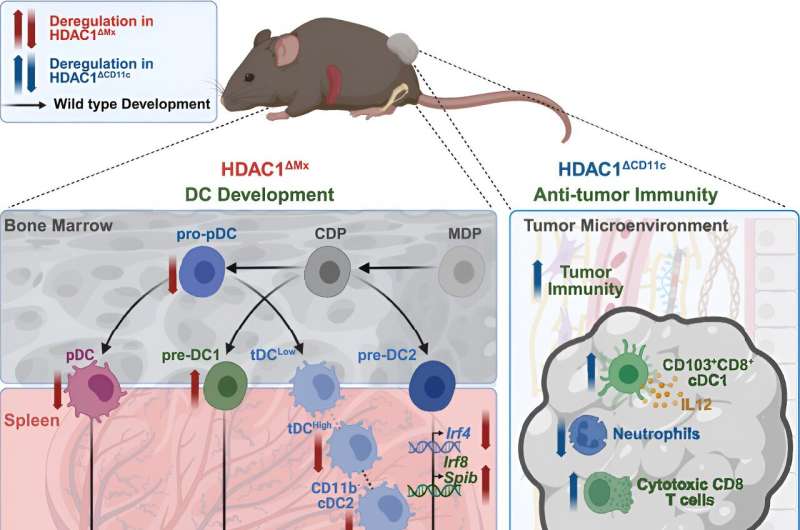This article has been reviewed according to Science X's editorial process and policies. Editors have highlighted the following attributes while ensuring the content's credibility:
fact-checked
peer-reviewed publication
trusted source
proofread
Inhibition of epigenetic control enzymes in immune cells as a potential new starting point in cancer immunotherapy

Immunotherapy is one of the pillars in the fight against cancer and aims to enable the body's own immune system to fight a tumor. A recent study now shows that removing certain enzymes that regulate epigenetic processes from the so-called dendritic cells of the immune system influences their development and thus improves anti-tumor immunity.
This finding could lead to new therapeutic strategies in immunotherapy. The study by Cristiano De Sá Fernandes from Maria Sibilia's research group at the Center for Cancer Research and the Comprehensive Cancer Center of MedUni Vienna and Vienna General Hospital was published in Cell Reports.
Cancer cells are the body's own cells that do not divide and develop as intended and abandon their place and function in the body. The difficult thing about fighting them is that, as the body's own cells, the immune system cannot recognize them well and therefore cannot fight them. This is where immunotherapy kicks-in: It enables the patient's own immune system to identify the cancer cells and activate the body's own defenses.
Dendritic cells (DCs) are important cells of the immune system that develop from precursor cells and can form different subgroups by changing their gene activity. These subgroups fulfill different functions in the immune system. However, it is not yet known exactly how certain epigenetic changes in chromatin (the material that makes up chromosomes) influence the development of DCs.
In the study, the researchers inhibited two enzymes that regulate such epigenetic processes to see how this affects the development and function of DCs. They focused on the specific enzymes HDAC1 and HDAC2.
Improved immune response
Through multi-omics analyses, i.e. the analysis of several biological data such as gene expression and chromatin accessibility, the researchers found that the development of certain subgroups of DCs was impaired by the absence of HDAC1. This shows that HDAC1 plays a crucial role in their development.
In the absence of HDAC1, DCs change their immune response, which improves tumor surveillance. Removing the enzyme HDAC2, on the other hand, had no major effect on the development of DCs.
In summary, the study shows that the removal of HDAC1 influences the development of certain DC subsets and improves anti-tumor immunity. These findings could lead to new therapeutic strategies in cancer immunotherapy.
More information: Cristiano De Sá Fernandes et al, The histone deacetylase HDAC1 controls dendritic cell development and anti-tumor immunity, Cell Reports (2024). DOI: 10.1016/j.celrep.2024.114308



















